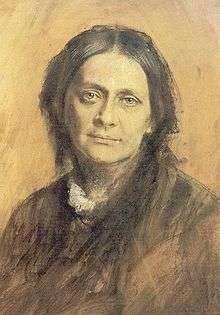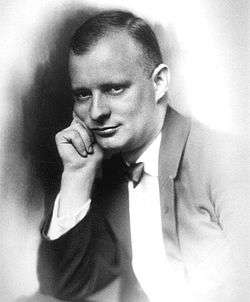Hoch Conservatory
| Dr. Hoch’s Konservatorium - Musikakademie Frankfurt am Main | |
|---|---|
| Director | Mario Liepe |
| Founded | 1878 |
| Location | Frankfurt am Main, Hesse, Germany |
| Students | ca. 1000 |
| Lecturers | 80 |
| Departments | Music Studies Department Diplom in Music Pre-College-Frankfurt Program (PCF)
Music Education for Youth and Adults (ANE)
Ballet Department |
| Address | Sonnemannstr. 16 60314 Frankfurt am Main |
| Homepage | http://www.dr-hochs.de |
Dr. Hoch’s Konservatorium - Musikakademie was founded in Frankfurt am Main on 22 September 1878. Through the generosity of Frankfurter Joseph Hoch, who bequeathed the Conservatory one million German gold marks in his testament, a school for music and the arts was established for all age groups. It has played an important role in the history of music in Frankfurt. Many famous musicians have taught there: in the late 19th century, with teachers like Clara Schumann on the faculty, the Conservatory achieved international renown. In the 1890s about 25% of the students were from other countries: 46 were from England and 23 from America.
In the 1920s, under director Bernhard Sekles, the Conservatory was far ahead of its time: Sekles initiated the world’s first Jazz Studies (directed by Mátyás Seiber) and in 1931 the Elementary Music Department.
Today Dr. Hoch's Conservatory offers instruction in the Music Education for Youth and Adults (ANE) program, the Elementary Music Department (Basisabteilung), and the Pre-College-Frankfurt (PCF) program, which provides preparation for future studies at a Hochschule or Conservatory. There are also Ballet, Early Music and New Music departments. The following qualifications are available: Diplom in Music and Diplomas in Music Pedagogy in all instruments, voice, music theory, composition, performance, and Elementary Music Pedagogy.


The German Federal Bank honored the Conservatory on the reverse side of the former 100 DM bill with a picture of the original Conservatory building, unfortunately bombed in World War II. Clara Schumann is pictured on the front side of the same bill.
Chronology






- 1857: 14 July: Dr. Joseph Hoch (1815–74) makes the Hoch Conservatory foundation the main heir of his fortune.
- 1874: Dr. Hoch dies on 19 September.
- 1876: The foundation is officially recognized (16 March).
- 1877: 16 February: Recognition of the foundation's governing body by the Frankfurt Magistrate, Chairman Dr. Heinrich Mumm von Schwarzenstein (until 1890).
- June: Joachim Raff elected first director of the Hoch Conservatory.
- 1878: 22 September: Opening ceremony in the Frankfurt Saalhof.
- 20 October: Clara Schumann's 50th anniversary as a performer.
- 1879: 10 February: first internal student concert.
- 9 June: Frankfurt visit by Franz Liszt.
- 1880: Differences between Raff and Julius Stockhausen, who resigns on 1 September.
- 1882: Joachim Raff dies on 24 June. His successor, Bernhard Scholz, appointed on 11. November.
- 1883: 21. January: Secession of the followers of Raff, which leads in April to the opening of the Raff-Konservatorium.
- 21. March: Bernhard Scholz takes over as director.
- 1884: Julius Stockhausen resigns for a second time (1 April).
- September: Opening of the Seminar (Director: Iwan Knorr).
- 1886: September: Opening of the pre-school: Hans Pfitzner studies at the Hoch Conservatory (with scholarship) until 1890.
- 1888: 29. April: Inauguration of the new Conservatory building.
- 1890: Dr. Theodor Mettenheimer takes over the chairmanship of the governors. State subvention for 2 scholarships. Engelbert Humperdincks begins teaching (1890–97).
- 1892: Clara Schumann retires. The Hoch Conservatory takes over the training for the scholarships of the Mozart-Foundation.
- 1896: Clara Schumann dies on 20 May.
- 1901: Heinrich Hanau becomes chairman of the governors (until 1904).
- 1904: Emil Sulzbach called to be chairman (until 1923).
- 1908: Bernhard Scholz resigns. Iwan Knorr becomes director. Opening of the Orchestra School.
- 1909: Paul Hindemith receives a scholarship and is accepted as a student of Rebner.
- 1916: Iwan Knorr dies 22 January. In September Waldemar von Baußnern takes over as director.
- 1918: Opening of the Singing School Seminar.
- 1921: Tension between the governors and director. Inflation forces the foundation to ask for subventions from the city and the state of Hesse. Plans for a "Hochschule" for Frankfurt (Leo Kestenberg).
- 1923: 27 April Waldemar von Bausznern retires. Hermann Scherchen applies for the job of director. Resignation of Emil Sulzbach.
- 1924: Bernhard Sekles appointed director. Opening of the Opera School. Dr. Oswald Feis becomes chairman of the foundation.
- 1926: Seminar for private music teachers and »Conservatory for listeners of Music« opened.
- 1928: Opening of the first academic Jazz classes anywhere under the direction of Mátyás Seiber. Concerts held in the "Volksbildungsheim" (Hermann von Schmeidel).
- 1931: Courses in Children's Musical Pedagogy.
- 1933: Dismissal of the director Bernhard Sekles and all Jewish and foreign teachers (10 April).
- Dr. Hans Rumpf becomes chairman of the foundation and Bertil Wetzelsberger director.
- 17 October: Opening of the »Hochschule für Musik und Theater der Stadt Frankfurt am Main« without permission of the Ministry of Culture. Growing influence of Artistic Director Hans Meißner.
- 1936: Hermann Reutter becomes director.
- 1937: 19 October: Contract between the City of Frankfurt and the foundation Dr. Hoch's Konservatorium concerning the establishing of a state "Hochschule" for Music.
- 1938: 1 April: Opening of the state "Hochschule". The Conservatory degraded to a pre-school.
- 1943: 4 October: Conservatory building hit by aircraft bombing. Move to the Passavant-Gontard'sche Palais.
- 1944: February: Passavant-Gontard'sche Palais also destroyed.
- 1947: Reopening of the Department of Church Music in April and the Department of School Music in the autumn.
- 1950: Walther Davisson becomes Artistic Director of the "Hochschule".
- 1951: Recommencing of teaching at the Hoch Conservatory in a building constructed on the ruins at Eschenheimer Landstr. 4 (Volksbildungsheim). Chairman of the foundation also funktions as city councillor.
- 1954: A board of directors installed for the "Hochschule" and Conservatory.
- 1958: Philipp Mohler becomes director of the unified "Hochschule" and the Hoch Conservatory.
- 1967: The Frankfurt Magistrate nullifies the 1937 contract.
- 1971: Plans for joining the Conservatory with the Music School meet with resistance. The Conservatory becomes a stepping stone between the Music School and "Musikhochschule".
- 1973: Philipp Mohler resigns as director of the Hoch Conservatory. Klaus Volk becomes director of the unified Conservatory and Music School.
- 1977: Klaus Volk resigns. Prof. Hans Dieter Resch, rector of the "Musikhochschule", becomes provisional director of the Conservatory, and in 1978 Alois Kottmann.
- 1979: Frank Stähle becomes director. Under his direction the Conservatory is restructured and again becomes an institute for training professional musicians.
- 1986: Alterations begin at the Philanthropin, a former Jewish school in Frankfurt's North End. Move to the Philanthropin takes place in stages: 1986-1989.
- 1989: Move to Philanthropin completed. Opening ceremonies on February 9. Stadträtin Jutta Ebeling replaces Bernhard Mihm as Chairperson of the foundation.
- 2002: The Hoch Conservatory is given the status of Music Academy.
- 2005: Move to the newly built Education Center Ostend (BZO).
- 2007: Frank Stähle retires and Werner Wilde becomes provisional director for one year.
- 2008: Mario Liepe is appointed director.
Directors

- 1878–1882: Joseph Joachim Raff
- 1883–1908: Bernhard Scholz
- 1908–1916: Iwan Knorr
- 1916–1923: Waldemar von Baußnern (also: von Bausznern)
- 1924–1933: Bernhard Sekles
- 1933–1936: Bertil Wetzelsberger
- 1936–1944: Hermann Reutter
- 1950–1954: Walther Davisson
- 1954–1958: Helmut Walcha, Erich Flinsch, Gustav Lenzewski
- 1958–1973: Philipp Mohler
- 1973–1977: Klaus Volk
- 1977–1979: Hans Dieter Resch, Alois Kottmann
- 1979–2007: Frank Stähle
- 2007–2008: Werner Wilde, Provisional Director
- 2008–: Mario Liepe
Famous Teachers

- 1878–1880 and 1883-84: Julius Stockhausen
- 1878–1883: Anton Urspruch
- 1878–1882: Joachim Raff
- 1878–1892: Clara Schumann
- 1878–1880: Carl Heymann
- 1878–1904: Hugo Heermann
- 1878–1910: Bernhard Cossmann
- 1882–1907: Lazzaro Uzielli
- 1883–1908: Iwan Knorr
- 1883–1902: James Kwast
- 1884–1923: Ernst Engesser
- 1890–1897: Engelbert Humperdinck
- 1893–1904: Carl Friedberg (also: Karl)
- 1894–1906: Hugo Becker
- 1895–1897: Marie Hanfstängl
- 1896–1933: Bernhard Sekles
- 1899–1912: Johannes Hegar
- 1904–1908: Hermann Zilcher
- 1904–1907 and 1908–1933: Adolf Rebner
- 1905–1906: Johannes Messchaert (also: Johan)
- 1906–1933: Alfred Auerbach
- 1908–1916 and 1929–1942: Alfred Hoehn
- 1912–1917: Margarete Dessoff
- 1926–1928: Hermine Bosetti
- 1926–1932: Ludwig Rottenberg
- 1928–1933: Mátyás Seiber (Director of the first academic Jazz department)
- 1930–1933: Herbert Graf (Opera School)
- 1933–1938: Helmut Walcha
- 1933–1942: Kurt Hessenberg
- 1933–1945: Gerhard Frommel
- 1936–1940: Anton Biersack
- 1954–1974: Peter Cahn
- 1958–19??: Alois Kottmann
- 1976–: Albert Mangelsdorff
- 1985–1996: Richard Rudolf Klein
- 1981–2000: Gerhard Schedl
Famous Students


- 1879–1882: Edward MacDowell
- 1886–1890: Hans Pfitzner
- 1891–1893 and 1896-1899: Cyril Scott (Frankfurt Group)
- 1893–1895: Margarete Dessoff
- 1893–1897: Norman O'Neill (Frankfurt Group)
- 1894–1896: Henry Balfour Gardiner (Frankfurt Group)
- 1894–1901: Walter Braunfels
- 1895–1900: Percy Grainger (Frankfurt Group)
- 1895–1903: Johanna Senfter
- 1895–1898: Hans Jelmoli
- 1897–1901: Roger Quilter (Frankfurt Group)
- 1898–1903: Boris Hambourg
- 1900–1901: Ernest Bloch
- 1901–1902: Otto Klemperer
- 1903–1909: Reinhard Oppel
- 1904–1907: Hans Gebhard-Elsaß
- 1904–1908: Frederick Septimus Kelly
- 1908–1910: Richard Tauber
- 1909–1917: Paul Hindemith
- 1909–1913: Ernst Toch
- 1913–1916 and 1918–1920: Ottmar Gerster
- ca. 1915 Hans Rosbaud
- 1917–1931: Kurt Hessenberg
- 1924–1927: Alexander Schneider
Other Teachers
Other Students

- Vladimír Ambros
- Frederic Austin
- Erich Bender
- Carlo Bohländer
- Franz Magnus Böhme
- Leonard Borwick
- Catherine Carswell
- Torsten de Winkel
- Moritz Eggert
- Agnes Fink
- Ernst Fischer
- Clemens von und zu Franckenstein
- Oskar Fried
- Else Gentner-Fischer
- Frank Gerhardt
- Konrad Georg
- Heinz Gietz
- Eugen Henkel
- Daniel Hensel
- Herbie Hess
- Robin Hoffmann
- Alfred Hollins
- Erich Itor Kahn
- Alice Kaluza
- Hans Klotz
- Christof Lauer
- Tiana Lemnitz
- Uli Lenz
- Emil Mangelsdorff
- Annette Marquard
- Heinz Moog
- Sibylle Nicolai
- Walter Rehberg
- Max Rudolf
- Fritzi Scheff
- Erich Schmid
- Dietrich Schulz-Köhn
- Johanna Senfter
- Hermine Spies
- Rudi Stephan
- Stefan Thomas
- Richard Trunk
- Hans-Jürgen von Bose
- Hermann Hans Wetzler
Questionable for the lists: Famous Teachers and Students
- Theodor W. Adorno Private lessons with Bernhard Sekles, composition and Eduard Jung, piano
- Hans von Bülow Taught at the Raff-Konservatorium in Frankfurt
See also
- College or university school of music
- Frankfurt am Main
- Timeline of jazz education
- Jazz in Germany
- List of university and college schools of music
- List of pre-college music schools
References
- Stiftung Dr. Hoch's Konservatorium Joseph Hoch zum 100. Todestag, Frankfurt am Main: Kramer, 1974.
- Peter Cahn, Das Hoch'sche Konservatorium in Frankfurt am Main (1878-1978), Frankfurt am Main: Kramer, 1979. Chronology until 1978 used with kind permission of Dr. Peter Cahn, Frankfurt (translation by Edmund Brownless).
- Festschrift 125 Jahre Stiftung Dr. Hoch's Konservatorium Frankfurt am Main, Frankfurt am Main, 2003.
- Baker's Biographical Dictionary of Musicians, (Nicolas Slonimsky, Hrsg.) New York: G. Schirmer, 1958
External links
- Official Homepage
- The early reception of Jazz in Germany: Mátyás Seiber and the Jazz Orchester of the Hoch Conservatory in a radio recording from 1931
- The first jazz theory class, ever, wasn't offered in the United States—it was at the Hoch Conservatory in Frankfurt, Germany
- Dr. Hoch's Konservatorium seit Januar Musikakademie / Bericht vom Festakt zur Verleihung des Status einer Akademie (in German) Online Musik Magazin, 6 February 2002
Coordinates: 50°06′37″N 8°41′59″E / 50.1102°N 8.69986°E
|